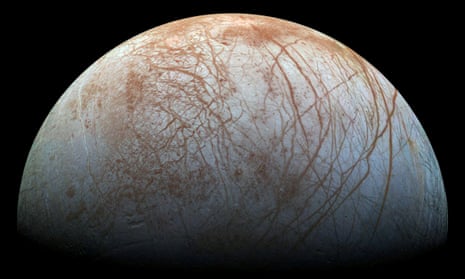In 1950 Enrico Fermi, an Italian-born American Nobel prize-winning physicist, posed a very simple question with profound implications for one of the most important scientific puzzles: whether or not life exists beyond Earth. The story goes that during a lunchtime chat with colleagues at the Los Alamos National Laboratory in New Mexico, the issue of flying saucers came up. The conversation was lighthearted, and it doesn’t appear that any of the scientists at that particular gathering believed in aliens. But Fermi merely wanted to know: “Where is everybody?”
His point was that, since the age of the universe is so great and its size so vast, with hundreds of billions of stars in the Milky Way alone, then unless the Earth is astonishingly special, the universe should be teeming with life. This might include intelligent species advanced enough to have the knowledge and technology necessary for space travel. They ought to have colonised the entire galaxy by now. So where are they all?
More recently, the late Stephen Hawking argued along similar lines. He said, “To my mathematical brain, the numbers alone make thinking about aliens perfectly rational.” Hawking was articulating the same popular argument as Fermi – that the sheer vastness of the universe all but guarantees we have company.
In recent years, scientists have begun to take the subject more seriously again. One of the most exciting areas of research in astronomy has been the discovery of extra-solar planets, worlds orbiting stars other than our sun. Many of them even appear to be Earth-like in size and climate. Astronomers now believe there are billions of these other worlds, many of which will have conditions suitable for life. The probability of life, maybe even intelligent life, existing on at least one of them must surely, therefore, be overwhelming.
Now however, scientists at the wonderfully named Future of Humanity Institute in Oxford have poured cold water on Hawking’s and others’ optimism. They have carried out a thoughtful statistical analysis by dissecting a mathematical relation known as the Drake equation, which allows us to calculate the probability of extraterrestrial life based on the combined probabilities of all the ingredients for life being in place.
Let me make clear at the outset that the Drake equation is not very scientific, for the sole reason that some of the factors that need to be fed into it are pure guesswork at this stage. Not the least of these is the big question: given all the things we believe are necessary for life (a source of energy, liquid water and organic molecules), how likely is it that life will emerge?
The authors of the new study offer two insights, one pessimistic and the other more cheery. The first is that Fermi’s paradox is easy to resolve. The reason we have not had any messages from ET is because, well, there is no ET out there. They calculate the probability we are alone in the universe to be in the range of 39%–85% and the probability that we are alone in our own galaxy to be between 53% and 99.6%. Basically, don’t hold your breath.
Biologists, of course, hate all this silly speculation. They quite rightly point out that we still do not properly understand how life originated here on Earth, so how can we possibly have any confidence in anticipating its existence or nonexistence elsewhere? There are some who argue that life on Earth appeared pretty quickly after the right conditions emerged almost 4bn years ago, which was when our planet had cooled sufficiently for liquid water to exist. Doesn’t that mean it could easily appear elsewhere too? Actually, no. A statistical sample of one tells us nothing. It is quite possible that biology is a freak local aberration, the product of a chemical fluke so improbable that it didn’t happen anywhere else in the observable universe.
So where do we stand? Well, there are reasons to believe that we may have an answer in the coming decade or two, one way or the other. Astrobiologists are about to search exoplanets for the gases produced by microbial life using sophisticated next-generation space telescopes. There is also the possibility of finding microbial life closer to home, under the ice of several of the moons of Jupiter and Saturn.
I did say that the study also provided some cheer. Some have claimed we have not found ET yet because intelligent life (including us) always annihilates itself before it can successfully develop the technology for interstellar travel or communication. But maybe the silence is simply because no such alien civilisations exist. So, as the authors put it, pessimism about our own future is therefore unfounded. We may be alone, but we may just survive.
